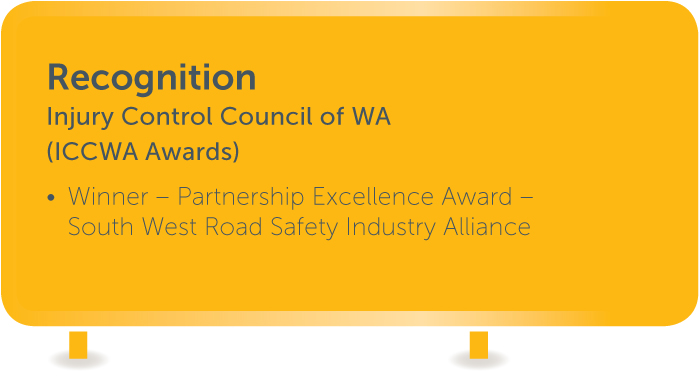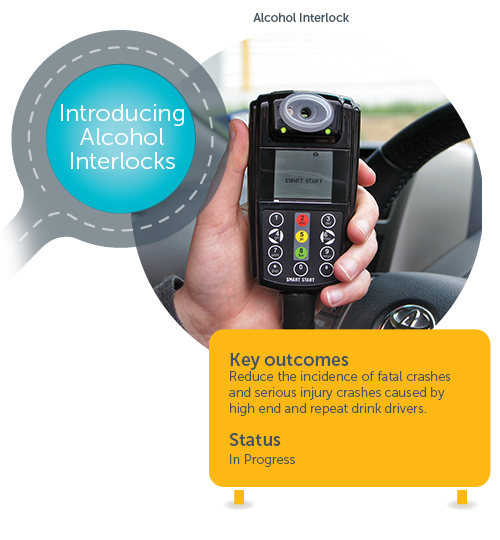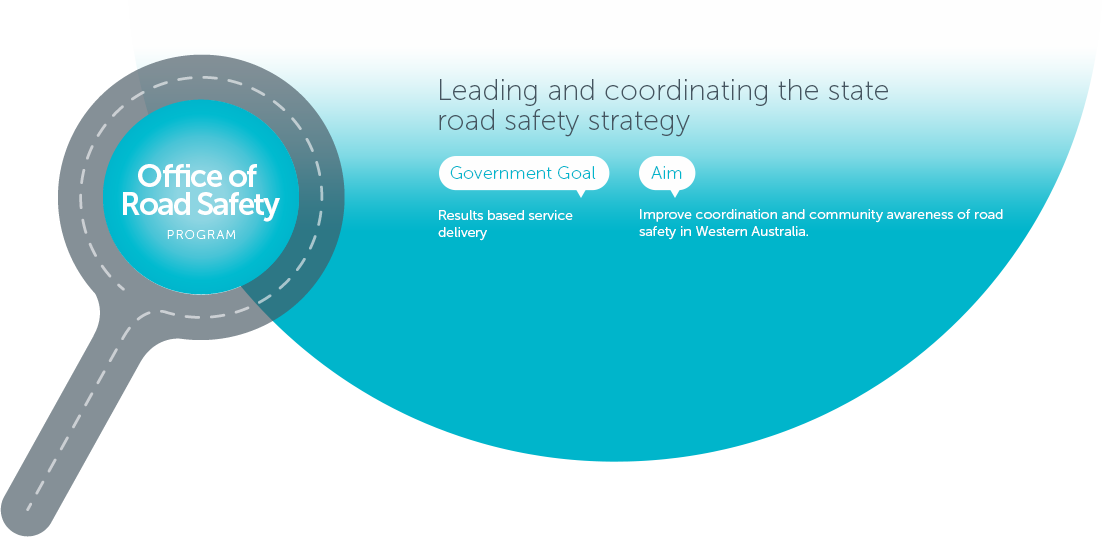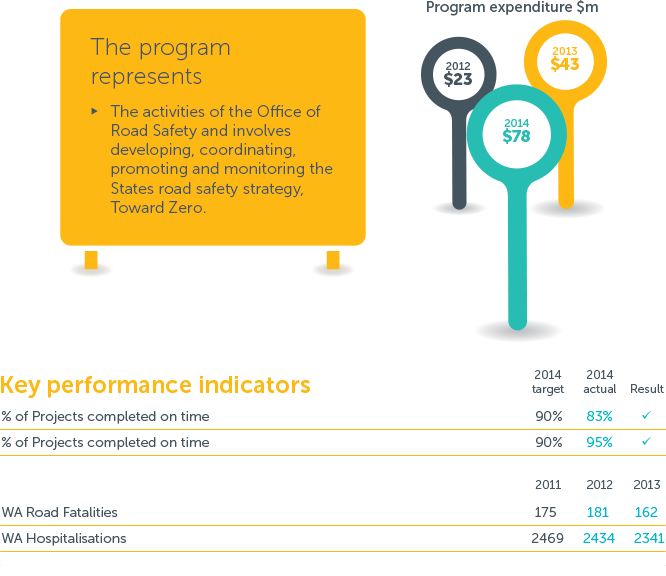Road Trauma Trust Account
As the organisation supporting the Minister for Road Safety in the administration of the Road Safety Council Act (2002), the Office of Road Safety (ORS) is responsible for managing the Road Trauma Trust Account (RTTA) to ensure value for money for road safety programs. The RTTA receives 100% of speed and red light camera fines revenue with the funds then provided to agencies and organisations to implement priority safety projects consistent with the Government’s Towards Zero strategy. The Office monitors and reports on implementation and results. Together with the Road Safety Council, ORS promotes the Towards Zero principle of shared responsibility of road safety with the objective of significantly reducing road trauma.
Towards Zero Safety Strategy
Towards Zero is the State’s road safety strategy endorsed by the Government. The underlying philosophy of the strategy is that we do not accept that any human being should die or be seriously injured on our roads. Realistically, we understand it is not practical to achieve zero fatalities on our roads by the year 2020, but we do not accept any death or serious injury as being inevitable. Using a Safe System approach, Towards Zero advocates for safe drivers in safe vehicles, travelling at safe speeds on safe roads. If all cornerstones of the Towards Zero strategy are fully implemented, we have the potential to save 11,000 people from being killed or seriously injured between 2008 and 2020. That is a reduction of around 40% on the 2005 to 2007 baseline. For more information visit the ORS website -www.ors.wa.gov.au.
Road Safety Council
The Road Safety Council (RSC) is chaired by Professor Murray Lampard APM and includes senior representatives from the Departments of Transport, Planning, Education and Health, Main Roads, Western Australian Local Government Association, Office of Road Safety, Insurance Commission of Western Australia, Western Australia Police and the Royal Automobile Club of Western Australia representing the State’s road users. The Council serves to identify, recommend and monitor the effectiveness of measures to improve road safety to the Minister for Road Safety and coordinates the implementation of agreed initiatives.
Key Achievements
Leading Business and Project Planning to Reduce Road Trauma in WA
The implementation of a results orientated performance monitoring framework has continued throughout the year. There is now a dedicated Project Performance Officer tasked to improve processes around planning and reporting of projects, as well as ensuring that these projects are in line with the goals and objectives of Towards Zero. The focus of this work and the key achievements are in line with recommendations from a review by the Office of the Auditor General into the management of the Road Trauma Trust Account and include the implementation of an updated RSC Governance Charter and RSC Code of Conduct, as well as improved KPI reporting.
Australian Fatal Road Crash Analysis
Innovative work has continued during 2013-14 to analyse fatal crashes that occurred on our network in 2012 and through forecasting, determine the number of fatal crashes that could be expected to be prevented by 2020 if treatments to State roads and anticipated safety improvements were implemented. This leading, innovative work developed with the generous assistance of the Trafikverket, the Swedish Transport Agency found that emerging road safety problems will need to take account of future scenarios rather than just the historical crash trends. The results indicate that up to 17 lives could be saved if anticipated initiatives are put in place and that, in most cases, factors other than extreme risk-taking were at play. The greatest impact is on lives lost in single vehicle run-off road crashes, with continued investment in run-off road programs in regional areas. The level of aspiration under the State road safety strategy, Towards Zero, continues to be ambitious (i.e. an ultimate goal with a stretch performance target by 2020 to lift implementation above business as usual approaches).
Penalty Review
This year the WA Road Safety Minister the Honourable Liza Harvey MLA announced her intention to amend legislation to implement significant changes to penalties for 115 road traffic offences under the WA Road Traffic Code 2000. While some amendments have occurred between 2007 and 2011, in many cases the penalties had remained largely unchanged since 1997.
The review of penalties was based on research from the Centre for Accident Safety Research and included recommendations considered for local relevance by a Road Safety Council working group with further consideration given to community acceptability. Effective 26 September 2014, penalties will be increased for mobile phone offences, red light running, failure to give way (particularly to pedestrians) as well as offences relating to speeding, drink driving for novice drivers, non-use of restraints and motorcycle helmets. A new offence has been created for deliberately altering or obscuring a number plate, an emerging trend that enables drivers to avoid speed camera detection and which features strongly in fuel drive offs and organised crime. The focus of these changes are on improving community safety, deterring illegal behaviours and reducing crash and injury risks.
Stars on Cars Dealership Program
The Government committed to work in partnership with industry to promote the uptake of five star safety (ANCAP) rated vehicles in the WA market. The Minister for Road Safety Liza Harvey MLA obtained the support of three of the leading business leaders in the local vehicle industry. The ORS then worked with the industry to develop a ‘Stars on Cars’ dealership program. Commencing in June 2014 with nearly 50 participating vehicle dealerships in the Perth metropolitan area, the program provides new vehicle dealerships with information and materials to promote ANCAP 5 star safety rated vehicles at the point of sale to purchasers. These materials ensure consumers have better access to vital vehicle safety information when purchasing a new vehicle, and are made available at no cost to the dealership. It is anticipated that this program will expand to more dealers across the metropolitan area and into the major regional dealerships in the 2014-15 financial year.
Partnership Program
Improving and promoting road safety is a multi-faceted task that requires a partnership approach. Last year ORS continued to work with various Government and commercial partners to promote road safety with the major areas of focus including:
- Regional Road Safety Industry Alliances – This involves supporting three existing Industry Alliances (located in the Pilbara, Southwest and the Mid-west regions) to deliver road safety initiatives at a regional level. ORS are currently investigating interest and value in other Industry Alliances in the Goldfields Esperance region.
- The International Drivers Initiative – From 2014, major car rental companies were encouraged to display ‘Keep left’ information inside their hire vehicles and at their reception counters to remind international drivers to keep to the left hand side of the road in Australia.
- The Workplace Road Safety Project – The previous manual system used by companies to create Road Safety Policies was transitioned to a web-based platform. Early feedback is positive.
Community Grants Program
In 2013 the Minister for Road Safety asked the ORS to administer the Road Safety Community Grants program. Through this program, community groups are able to apply for grant funding for events or projects that met set criteria. Each application is assessed by a Community Grants Committee, led by the Road Safety Council Chair, and recommendations are forwarded to the Minister for Road Safety for approval.
The numbers:
Over the past year:
- 94 applications received
- 72 approved
- 7 not approved
- 15 pending
Community Education Program
Budget allocations to community road safety education campaigns were reduced this year while the Government undertook a comprehensive review of the effectiveness of mass media for promoting road safety in Western Australia. Once completed, the review will identify any gaps in the way mass media campaigns are developed, and also provide guidance and consistency with methodology and best practice from around Australia and the world.
While awaiting this review, we continued with high priority safety campaigns to reduce speeding, drink driving and the promotion of safer vehicles.
A campaign was also developed and scheduled to introduce the new offences (mobile phones and contravening red traffic signals) that would attract double demerits from the 2014 Easter long weekend. This was a first for the ORS, in that all materials for this campaign were developed in-house, including the radio advertisement which was written and recorded by ORS staff.
 Looking Ahead
Looking Ahead
- Implement the outcome of the Government’s review of the road safety framework in WA.
- Implement the outcomes of the Government’s review of road safety mass media campaigns.
- Analyse crashes and monitor and report on progress to identify measures to further reduce serious trauma on WA roads
- Research and develop policy and programs that will further improve road safety outcomes on WA roads
- Implement agreed enhancements to road traffic penalties and to the way recidivist drink drivers are managed.
- Administer the Road Trauma Trust Account to ensure that funded projects address the priority crash problems on WA roads are effective and achieve value for money.
Alcohol is a factor in about one quarter of all fatal crashes and one in 10 serious injury crashes. With so many road users at risk, action needed to be taken. Read More

In May 2014 the Minister for Road Safety, supported by the cross-agency Repeat Drink Driving Working Group, chaired by the Office of Road Safety, introduced a Bill to establish legislation for an alcohol interlock scheme for Western Australia.
An alcohol interlock is a device which prevents a vehicle from being operated if a breath sample provided reads above a certain alcohol level. Major evaluation studies of offender programs have shown an average reduction of 64% in drink driving reoffending while an alcohol interlock is fitted.
The proposed scheme will target first time high-end and repeat drink drivers, restricting them to only drive a vehicle in which an approved alcohol interlock device has been installed.
Existing fines and periods of disqualification continue to apply and those targeted will be subject to monthly monitoring and referral to alcohol treatment if found to be non-compliant.
This is a significant milestone and is testament to the work of many Western Australian road safety practitioners over an extended period. The ORS is working closely with the Department of Transport which has lead responsibility for implementation.
Debate on this legislation is expected in the second half of 2014, with implementation of the scheme anticipated in early 2016.



